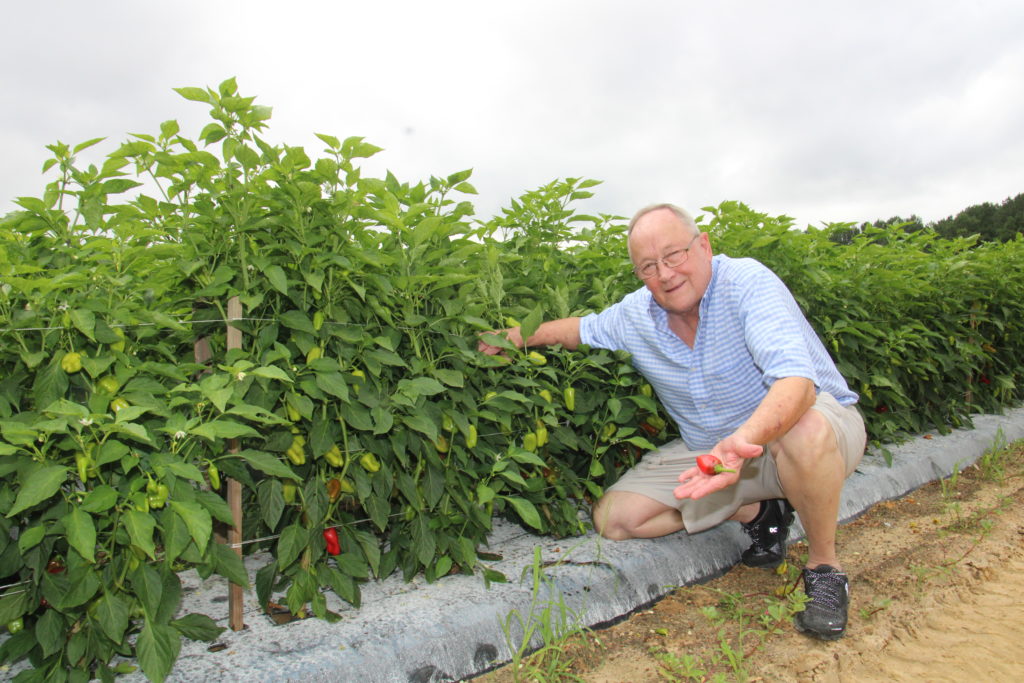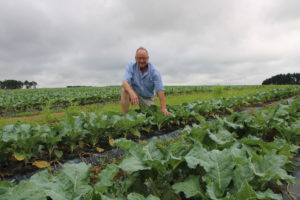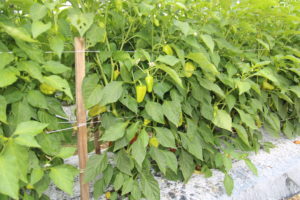
Jan 27, 2023Lewis Taylor Farms counters rising labor costs
Lewis Taylor Farms Inc., one of the Southeast’s largest privately-owned vegetable and greenhouse operations, battles escalating costs through in-house mechanization and efficient use of labor as well as improved methods of fighting pests and diseases.
In 2019, the farm paid $350 a ton for fertilizer. Today, it’s $960. Cartons have doubled in cost, increasing 8% twice in 2021 and increasing another 8% in 2022, with plastic up 15%. Seed companies are seeking additional increases of 15%.
“I don’t know how in the world they expect growers to pay that kind of money,” said Bill Brim, president, CEO and co-owner.

To save money, the Tifton, Georgia, company improvises when possible to make processes more mechanical.
“We are trying to do everything we possibly can to create new things and new ways to cut labor, to produce seeds and to do a better job improving our yields,” Brim said. “We have a staff that helps us manufacture a lot of our own equipment on the farm. We are doing anything possible that can make it more mechanical.”
Brim said the University of Georgia (UGA) plans to hire a breeder to focus research on how to ensure crops will mature simultaneously.
“We need varieties that will produce at the same time, so we can pick that one bush all at once and be done with it,” he said.
Combining a streamlined crop maturation with mechanical harvesting could save as much as 25% in labor, Brim said.
In the past, Georgia growers relied on Extension expertise from the University of Florida. Today, UGA staff does well with Extension and researchers working together, Brim said. UGA’s 80% research and 20% Extension ratio allows for better field protocols, which assist growers with practical solutions, he said.
Greens expansion
Production often increases by a couple hundred acres a year for the company, which grows a large variety of vegetables and melons. This year, however, acreage could decrease following H-2A wage hikes that became official on Jan. 1, Brim said. Georgia, along with Alabama, Arkansas, Louisiana, Mississippi and South Carolina, has an H-2A hourly rate of $13.67. For Georgia, that’s a 14.1% increase from last year.
 Lewis Taylor’s biggest items are greens, cabbage, bell peppers, cucumbers and squash. It also grows broccoli, specialty peppers, eggplant and tomatoes, and Athena cantaloupes and watermelons on about 7,000 acres.
Lewis Taylor’s biggest items are greens, cabbage, bell peppers, cucumbers and squash. It also grows broccoli, specialty peppers, eggplant and tomatoes, and Athena cantaloupes and watermelons on about 7,000 acres.
Tracing its heritage to the 1930s, Lewis Taylor Farms transitioned from growing transplant vegetables and tomatoes to growing fresh produce in the 1990s, beginning with peppers, cucumbers and squash. Then came greens, which the farm started growing in 2006. The company grows collards, kale, turnips and mustard greens, with harvest beginning in late September.
Greens were added to keep labor occupied following the end of Georgia fall vegetable production, which typically ends in November. Greens harvest throughout the year, but see the highest volume after Christmas to May.
In 2010, the farm began experimenting with broccoli, and became the first Southeastern grower to plant the crop, Brim said. Lewis Taylor started with 400 varieties, but reduced that to three varieties through trials.
Labor challenge
In addition to soaring input costs, Lewis Taylor is feeling the pinch from expanding Mexican spring competition.
“All of the southeastern U.S. is competing with Mexico in April, May and June,” Brim said. “That’s hurt us in the last five years since they started infringing into that time slot. We had a good run until then. It’s hard to compete with 81 cents an hour labor.”
With the 2023 Adverse Effect Wage Rate, which determines minimum wages for H-2A workers, increasing 14.1%, growers like Brim are finding it more difficult to survive.
“We were having a hard time making it work at $12 an hour,” he said. “Now, it’s raised another $1.68 when we could hardly keep them paid up at $11.99.”
Scan cards more efficiently monitor workers’ performance and aid accounting. Lewis Taylor staff daily discusses how it can reduce labor costs.
The first Georgia farm to use H-2A labor, 80% of Lewis Taylor’s labor signed on in 1997, requiring younger workers to succeed the aging workforce.
“You really have to stay on top of it,” Brim said. “You must make sure your supervisors are getting the most you can out of them.”
That involves ensuring workers aren’t idle but receive plenty of water and rest times and are treated well, he said.
Technology, including computerized drip irrigation, helps consistently apply water and nutrients. Plasticulture reduces weed competition and advances crop yields. For years, Lewis Taylor’s drones have scouted fields to quickly display disease pressure. GPS ensures crop rows are consistent and fields are level.
To control pests including diamondback moths, which harm greens and cabbage, and pepper weevils, which damage jalapenos, cubanelles and red fresnos, the company tests crop protectants, experimenting with different chemicals. Constant pest monitoring is required.
Fighting weeds, pests
Hosting seed company and university variety trials, new crops remain key to Lewis Taylor’s success.
“You want the best crop for the best variety to have the best yield,” Brim said. “With so many different varieties out there, you need to make sure you’re picking the right ones. You don’t want to do something only for the sake of doing something. You want to do it right and want to do it to be the best, not that you’re the best.”
 Extension personnel are provided spots in fields for crop destruction tests and experimental spraying. As growers don’t want to spray more than needed, the trials are good at showing which products work well, such as copper, and how many pounds per acre must be sprayed, Brim said.
Extension personnel are provided spots in fields for crop destruction tests and experimental spraying. As growers don’t want to spray more than needed, the trials are good at showing which products work well, such as copper, and how many pounds per acre must be sprayed, Brim said.
In the early 2000s, Brim worked closely with UGA researchers on methyl bromide replacements. He helped researchers test and develop a methyl bromide alternative known as the UGA 3-WAY: Telone II, chloropicrin and metam, a three-way replacement to manage insects, nematodes, soilborne pathogens and weeds. Brim worked to ensure growers received the benefits of controlling those pests, including purple and yellow nutsedge weeds.
“If we didn’t have the three-way, we would have been out of business by now,” Brim said.
Soil tests help maintain soil health. Most of the company’s produce is grown on plasticulture, except for some cabbage, greens and broccoli, gaining three to four crops off a single layer of plastic. Through double-cropping cantaloupes with cotton, the farm more efficiently uses cover crops in row middles. During the fall, millet is planted.
Brim grew up on a farm near Pelham, Georgia, west of Moultrie. After attending Abraham Baldwin Agricultural College in Tifton, Brim worked for a feed and fertilizer company. During the 1980s, his father-in-law, the father of current business partner Ed Walker, requested Brim help them on the farm. Brim and Walker then began buying out the farms’ owners.
The two have worked together for nearly 40 years. Their children also work the farm, which include entities handling produce growing, packing and hydrocooling, as well as greenhouses that grow vegetable, cantaloupe and watermelon transplants.
“We have been blessed with good people working for us and people who don’t mind working,” Brim said. “This has given us great opportunities to expand our operation.”
Being one’s own boss is a great benefit of farming for Brim.
“Farmers love seeing things grow,” he said. “You kind of get farming in your blood. You love seeing things grow.”
— Doug Ohlemeier, assistant editor
Top photo: Bill Brim of Lewis Taylor Farms examines mini sweet specialty peppers. Lewis Taylor works to make farming more efficient through experimenting with crop protectants and other measures. Photos: Doug Ohlemeier
Second photo: Lewis Taylor’s biggest items are greens, cabbage, bell peppers, cucumbers and squash. It also grows broccoli, specialty peppers, eggplant and tomatoes, and Athena cantaloupes and watermelons on about 7,000 acres.
Third photo: Mini sweet specialty peppers.
















